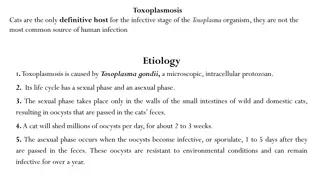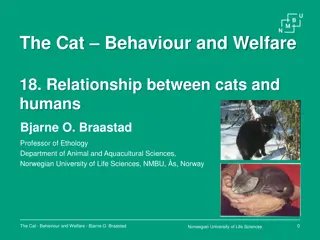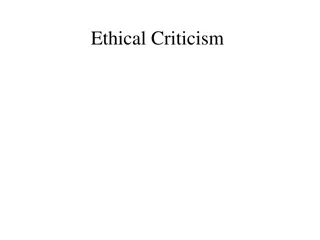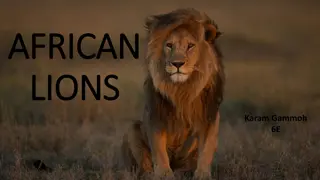Insights on Cats in Rabbinic Literature
Explore the various perspectives on cats in Rabbinic literature, ranging from their role in teaching modesty and cleanliness to potential dangers they pose, such as venom. Discover how cats are viewed in Jewish texts, including references from the Tanach, the Talmud, and other ancient writings.
Download Presentation

Please find below an Image/Link to download the presentation.
The content on the website is provided AS IS for your information and personal use only. It may not be sold, licensed, or shared on other websites without obtaining consent from the author.If you encounter any issues during the download, it is possible that the publisher has removed the file from their server.
You are allowed to download the files provided on this website for personal or commercial use, subject to the condition that they are used lawfully. All files are the property of their respective owners.
The content on the website is provided AS IS for your information and personal use only. It may not be sold, licensed, or shared on other websites without obtaining consent from the author.
E N D
Presentation Transcript
Talmud in English Cats May 13, 2020
Tanach Ezekiel 16:4 As for your birth, when you were born your navel cord was not cut, and you were not bathed in water to smooth you; you were not rubbed with salt, nor were you swaddled. Job 38:9 When I clothed it in clouds, swaddled it in dense clouds
Eruvin 100b Rabbi Yo anan said: Even if the Torah had not been given, we would have learned modesty from the cat, and stealing from the ant, and forbidden relations from the dove, and proper relations from the rooster, which appeases and then mates. Cats are Good
Bava Kamma 80a Just as the Sages said that one may not raise small domesticated animals, i.e., sheep and goats, so too they said that one may not raise small undomesticated animals. Rabbi Yishmael says: One may raise village dogs, cats, monkeys, and genets, because they serve to clean the house of mice and other vermin. Cats are Good
Pesahim 112b Rav Pappa said: With regard to a house in which there is a cat, a person should not enter there barefoot. What is the reason? Because the cat might kill a snake and eat it, and the snake has small bones, and if a small bone gets into one s foot it cannot be removed and he will be in danger. Some say that Rav Pappa said: With regard to a house in which there is no cat, a person should not enter there in the dark. What is the reason? Since there is no cat to hunt snakes, perhaps a snake will wrap itself around him without him knowing and he will be in danger. Cats are Good
Chullin 52b And an animal that was clawed by a wolf is a tereifa. Rav Yehuda says that Rav says: In the case of an animal, it is a tereifa if it was clawed by any predator from the size of a wolf and upward. And with regard to birds, they are tereifot if they were clawed by any predator from the size of a hawk and upward. What does this statement of Rav serve to exclude? If we say it serves to exclude a cat that clawed an animal, since it is smaller than a wolf, we already learned in the mishna: And an animal clawed by a wolf is a tereifa. One can infer from this that cats do not render an animal a tereifa. There was a certain hen that was in the house of Rav Kahana, which a cat pursued, and the cat entered after it into a small room, and the door shut in the cat s face, and it struck the door with its paws in anger. And afterward, five drops of blood, i.e., venom, were found on the door. Apparently a cat is venomous but its venom does not burn enough to render the animal a tereifa. Cats are Destructive
Ketubot 41b And now that you said that payment of half the damage is a fine, this dog that ate lambs, and a cat that ate large roosters, is unusual damage, for which the owner is liable to pay only half the damage if the animal was innocuous, and therefore, we do not collect it in Babylonia. The payment for unusual damage is a fine, and fines cannot be collected in Babylonia, as there are no ordained judges authorized to adjudicate cases involving fines. However, if the cat ate small roosters, that is its usual manner, and we collect the damages in Babylonia, as it is a payment of money. Cats are Destructive
Bava Kamma 80b A cat came and severed the hand of the baby. Rav emerged and taught: With regard to a cat, it is permitted to kill it even if it is privately owned; and it is prohibited to maintain it in one s possession; and it is not subject to the prohibition against theft if one takes it from its owner; and, in the case of a lost cat, it is not subject to the obligation of returning a lost item to its owner. Cats are Destructive
Bava Metzia 97a A certain man borrowed a cat from another. The mice banded together against it and killed it. Rav Ashi sat and raised a dilemma: In a case like this, what is the halakha? Cats are Destructive
Shulchan Aruch, Orach Hayim 266:4 An evil cat that harms children should not be returned to his owner; anyone that finds him can kill him and use his fur. Cats are Destructive
Bechorot 8a The Sages taught that a chicken hatches after twenty-one days, and corresponding to it in length of gestation with regard to trees is the almond, which ripens twenty-one days after the budding of the flower. A dog gives birth after fifty days, and corresponding to it with regard to trees is the fig. A cat gives birth after fifty-two days, and corresponding to it with regard to trees is the mulberry. A pig gives birth after sixty days, and corresponding to it with regard to trees is the apple. A fox and all types of creeping animals give birth after six months, and corresponding to them with regard to trees, i.e., plants, is grain. Cats are Strange
Horayot 13a The students of Rabbi Elazar asked him: For what reason does a dog recognize its master, while a cat does not recognize its master? Rabbi Elazar said to them: If it is established that with regard to one who eats from that which a mouse eats, eating that item causes him to forget, with regard to the cat, who eats the mouse itself, all the more so does eating it cause it to forget. Cats are Strange
Horayot 13b The Sages taught: There are five factors that cause one to forget his Torah study: One who eats from that which a mouse eats and from that which a cat eats, and one who eats the heart of an animal, and one who is accustomed to eating olives, and one who drinks water that remains from washing, and one who washes his feet with this foot atop that foot. And some say: Also one who places his garments under his head. Cats are Strange
Shabbat 142b Didn t Rava say to his attendant on a Festival: Roast a duck for me, and throw its intestines to the cat. Cats are Strange
Avodah Zara 30b The Master said above concerning exposed water: Nor give it to drink to his animal or the animal of another. But isn t it taught: One may give his own animal to drink? When that is taught, it is referring to a cat, as cats are less susceptible to snake venom. If that is so, let him also give the water to the cat of another. The venom weakens the cat of another. But doesn t the venom also weaken his own cat? It will later recover. The cat of another will also recover later. Although both will eventually recover, there are times that the owner wishes to sell the cat and loses potential profit from the cat s current weakness. Cats are Strange
Shabbat 51b Rather, is it not that the practical difference between their opinions is with regard to a cat? The first tanna holds that since a small rope suffices for the cat, a collar is considered a burden with which the cat may not go out into the public domain. And ananya holds that with regard to a device that provides excessive security, we do not say that it is a burden. . Cats are Strange
Sanhedrin 105a With regard to the verse: And the elders of Moab and the elders of Midian set out with their divinations in their hands, and they came to Balaam (Numbers 22:7), it was taught: Midian and Moab had previously never had peace between them, and they were always at war with each other. What led them to make peace at that time? There is a parable of two dogs that were with the flock, and they were hostile to one another. A wolf came and attacked one. The other one said: If I do not help him, today he kills him and tomorrow he comes to attack me. They both went and killed the wolf. Moab and Midian joined together to face the potential common threat, the Jewish people. Rav Pappa says that this is in accordance with the adage that people say: A weasel and a cat made a wedding from the fat of the luckless. Cats are Strange
Berachot 56b One who sees a cat in a dream in a place where in Aramaic they call it shunra, a nice song [shira na a] will be composed for him. If he sees a cat in a place where they call cats shinra, it is a sign that he will undergo a change for the worse [shinui ra] Cats are Strange
Berachot 6a One who seeks to know that the demons exist should place fine ashes around his bed, and in the morning the demons footprints appear like chickens footprints, in the ash. One who seeks to see them should take the afterbirth of a firstborn female black cat, born to a firstborn female black cat, burn it in the fire, grind it and place it in his eyes, and he will see them. Cats are Demons
Perek Shira The Cat says: "I shall pursue my enemies and overtake them, and I shall not return until they are destroyed." (Psalms 30:2) The Dogs are saying, Come, let us worship and bow down; let us kneel before YHVH our Maker. (Psalms 95:6)























